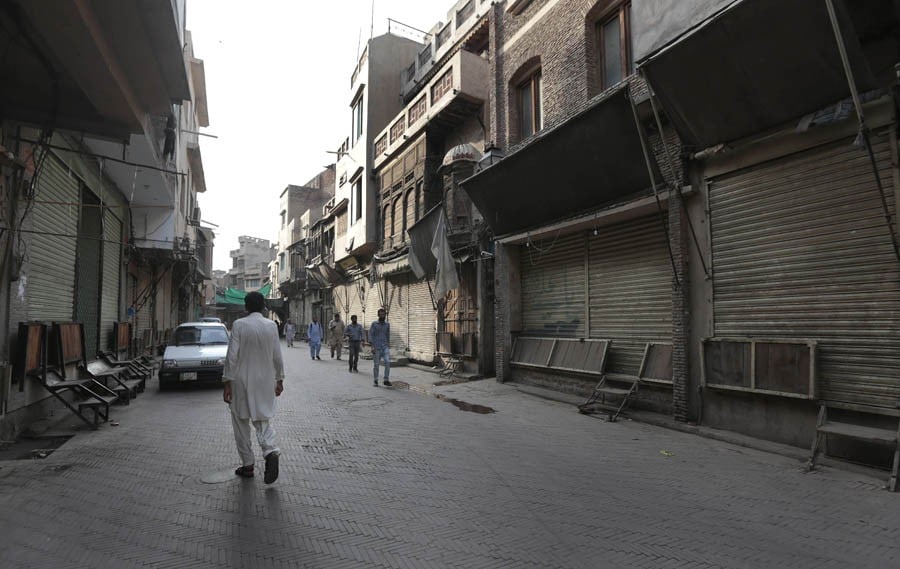
Offering incentives to traders may be a better way to bring them into the tax net

A shutters-down strike was observed all over the country on July 13 by traders in protest against tax measures announced by the federal government.
Though the list of grievances was quite long, the protest focused on the government’s decision to document transactions, making it compulsory for buyers to give their CNIC number on purchasing items worth Rs 50,000 or more, and imposing tax on retailers under different schemes. The traders had had discussions with the government before they gave a call for strike.
A major segment of the traders’ community has described the strike a big success. They claim the strike was observed in the interest of their community and that there was no political agenda behind it. However, some traders ignored the strike call and opened their shops. The estimated loss of business during the day, as claimed by traders, was around Rs 25 billion, keeping in view the fact that Saturday is a lean day in terms of daily turnover.
What did traders gain from the strike? What will be their future course of action? Is the government ready to revise its policy about the traders’ demands? Will the traders be able to circumvent new rules the way they did in the past? When the withholding tax was imposed on bank transactions made by non-filers, traders turned to cash dealings and started using written slips (parchis) as negotiable instruments.
Naeem Mir, the All Pakistan Anjuman Tajraan, secretary general, says the government is not concerned about the genuine issues of traders. He says they had expected the government to engage them in talks after the strike but they have not received an invitation so far.
Mir denies the impression that traders are opposed to documentation or paying taxes. "The real issue is that the new measures announced by the government will be counter-productive. For example, in case a buyer making a purchase above Rs 50,000 provides a wrong CNIC number to the retailer the axe will fall on the latter if the violation is detected." This condition, he adds, will also deter buyers from making purchases worth Rs 50,000 or more from the same shop. They will buy products from different shops to keep individual invoices below Rs 50,000 so that they do not have to provide their CNICs.
Retailers are also required to provide their CNICs when buying inventory from manufacturers. Those who do not will have to pay about 20 percent additional tax. "What the traders fear the most is the proposed inspection of business places and stocks. The FBR is seen as an oppressor," he adds.
Tax authorities, on the other hand, plan to continue with documentation of the retail sector. They allege that traders want to blackmail the government into maintaining the status quo through measures like strikes. However, there have been announcements about fixed tax for small traders made which FBR Chairman Shabbar Zaidi, says will provide them relief. The traders’ are not clear what this fixed tax should be. The community wants the government to explain the scheme.
The FBR has decided to launch three schemes for small, medium and big retailers. Small retailers have been defined as shopkeepers having a covered area of 240 square feet or less. They will be charged a fixed monthly tax regardless of their revenue. Medium-sized retailers are those having a covered area of more than 240 sq feet but less than 1000 sq feet. It is likely that their tax will be linked to their electricity bills. Big retailers, having a shop area exceeding 1,000 square feet, will have to install cash machines that would maintain record of revenue. Their tax will be determined according to regular tax regime.
Qasim Abbas, the Anjuman Tajraan, Urdu Bazar, Lahore vice president, believes the formula to determine tax category in accordance with the size of the shop will not work because many small shops have huge turnover and some big ones are making losses. "It is quite likely that many traders will shift to smaller shops to avail a fixed tax regime and the rents of such shops will skyrocket," he adds.
Many traders in Urdu Bazaar have not sought membership of the Lahore Chamber of Commerce and Industry (LCCI) because they are required to be taxpayers. A trust-building exercise between the two sides, instead of threatening announcements coming from the government, should be the priority, they say.
Abbas says the July 13 strike was pre-emptive but the real test will come after the new tax rules are implemented from August 1. He foresees more strikes and agitations from traders once tax authorities start visiting them and asking about compliance with the rules. "The few who sided with the government during the last strike will be on the forefront," he predicts. He dismisses the perception that there were any political elements behind the strike. "Even those people supported us who do not shut down their shops on Sundays."
Kashif Anwar, The Friends of Economic and Business Reforms (FEBR) president and former LCCI vice president, says it is unrealistic to set out to achieve in a year something that has not been achieved for decades. "The traders are willing to pay a fixed tax but do not want the FBR officials to visit and inspect their business spaces and stocks."
He says offering incentives may be a better strategy to bring traders into the tax net. For example, the retailers earning a revenue of about 10 million are charged 1.5 percent tax. This rate increases with increase in revenue. What happens is that traders declare lower than actual revenue to avoid higher tax rate. It would be better to decrease tax rate on higher revenues because this would encourage traders to make more transactions through banking channels. Otherwise, he says, they will do most transactions in cash.